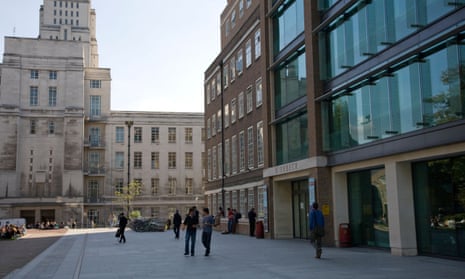Re Birkbeck providing second chances for so many (Letters, 14 November), in 1965, it was becoming increasingly hard for those of us approaching our 18th birthday to gain a university place. We were the baby boom generation. I had 10 O-levels and was taking four A-levels at a good state grammar school. Rejections from the Universities Central Council on Admissions (UCCA) were coming thick and fast. In January that year, Birkbeck announced that it would offer full-time places in geography, psychology, chemistry and mathematics. I was interviewed by professors in the geography department and when I explained my current UCCA status, they delighted in referring to me as “Davidge, the five-times rejected”, and one turned to his senior lecturer and said, “We won’t reject him, will we?”
Four years later, I had my degree and a PGCE. I spent nearly 40 years working in further education colleges and Birkbeck was my role model for second-chance learners. From 1980, I was developing access courses to break down the barriers for adults to get to university. With colleagues, I worked locally and nationally to provide opportunities for mature students. It was evangelical and at times miraculous.
All through this period, Birkbeck was my mentor. I well remember how, as a young undergraduate, after sitting through a few hours’ lectures, a pint and a game of darts at lunchtime, we encountered this tsunami of highly motivated adults who had worked all day, arriving to study from 6pm-9pm, sometimes four evening per week. They completely put us to shame. When the results came out, they got the firsts.
I retired as assistant principal of a large college in 2008, feeling that I had helped to enhance opportunities for adults in higher education. If it wasn’t for my experience at Birkbeck, I would never have understood the needs of adult students or what they could be capable of if, if given a chance. If they ever thanked me for helping to change their lives, my reply would have been to thank Birkbeck.
Alan Davidge
Noues de Sienne, France
The proposed redundancies at Birkbeck come as no surprise to me. For 17 years, from the early 1980s, I worked in its extra-mural department teaching music, and we had the finest resources including a book box for each class and multiple copies of musical scores so that each student could follow the music being performed.
Alas, this all changed in the mid-1990s, when the then Conservative government insisted on formal assessment of learning outcomes as a condition of government support.
This meant I was having to enforce a new regime whereby each student had to prove their “effectiveness” by producing four pieces of written work during the year. The average age of the students was 75 and it is no wonder that student numbers plummeted.
Stephen Baron
London
